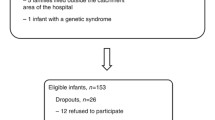Abstract
It is possible that reported links between postnatal depression and children's cognitive deficits can be completely explained by vulnerability factors in the child such as male gender and pre- and perinatal insults as well as known risk factors in the social environment. This hypothesis was evaluated, using prospective longitudinal data that had previously been obtained from a community sample of primiparous North London women, followed from early pregnancy until the children were 4 years old. Re-analysis of those data provided support for the original finding of an association between postnatal depression and impaired cognitive abilities in the children. There were, however, some important modifications: Low birth-weight infants and the infants of less educated mothers were most at risk. Perceptual and performance abilities were most affected.
Similar content being viewed by others
References
Cogill, S, Caplan, H, Alexandra, H, Robson, K, Kumar, R: Impact of postnatal depression on cognitive development in young children.Brit Med J 292: 1165–1167, 1986.
Bugental, DB, Blue, J, Cortez, V, Fleck, K, Rodriguez, A: Influences of witnessed affect on information processing in children.Child Dev 63: 774–786, 1992.
Dodge, KA: Emotion and social information-processing. InThe Development of Emotion Regulation and Dysregulation, eds. Garber, J, Dodge, KA. Cambridge: CUP, 1991.
Fagen, JW, Ohr, PS, Fleckenstein, LK, & Ribner, DR: The effect of crying on long-term memory in infancy.Child Dev 56: 1584–1592, 1985.
Singer, JM, Fagen, JW: Negative affect, emotional expression, and forgetting in young infants.Dev Psych 28: 43–57, 1992.
Weissman, MM, Leckman, JF, Merikangas, KR, Gammon, GD, Prusoff, BA: Depression and anxiety disorders in parents and children.Arch Gen Psychiat 41: 845–851, 1984.
Winters, KC, Stone AA, Weintraub, S, Neale, JM: Cognitive and attentional deficits in children vulnerable to psychopathology.J Ab Child Psych 9: 435–453, 1981.
Stevenson, J, Fredman, G: The social environmental correlates of reading abilities.J Child Psych Psychiat 31: 681–698, 1980.
Murray, L: The impact of postnatal depression on infant development.J Child Psych Psychiat 33: 543–561, 1992.
Harris, PL: Infant cognition. InCarmichael's Handbook of Child Psychology. Vol. 2, ed. Mussen, P. New York: Wiley, 1983.
Bornstein, MH, Sigman, MD: Continuity in mental development from infancy.Child Dev 57: 251–274, 1986.
McCall, RB, Carriger, M. A meta-analysis of infant habituation and recognition memory performance as predictors of later IQ.Child Dev 64: 57–79, 1993.
Field, T, Healy, B, Goldstein, S, et al.: Infants of depressed mothers show “depressed” behavior even with nondepressed adults.Child Dev 59: 1569–1579, 1988.
Sameroff, AJ, Seifer, R., Zax, M: Early development of children at risk for emotional disorder.Monogr Soc Res Child Dev 50: Serial No. 199, 1982.
Cicchetti, D, Ganiban, J, & Barnett D: Contributions from the study of high-risk populations to understanding the development of emotion regulation. InThe Development of Emotion Regulation and Dysregulation, eds. Garber, J, Dodge, K. Cambridge: CUP, 1991.
Kumar, R, Robson, K: A prospective study of emotional disorders in childbearing women.Brit J Psychiat 144: 35–47, 1984.
Breitmayer, BJ, Ramey, CT: Biological nonoptimality and quality of postnatal environment as codeterminants of intellectual development.Child Dev 57: 1151–1165, 1986.
Rutter, ML: A fresh look at ‘materna deprivation’. InThe Development and Integration of Behavior, ed. P. Bateson. Cambridge: CUP, 1991.
Moffitt, TE, Caspi, A, Harkness, AR & Silva, PA: The natural history of change in intellectual performance: Who changes? How much? Is it meaningful?J Child Psych Psychiat 34: 441–453, 1993.
Sameroff, AJ, Seifer, R, Baldwin, A, Baldwin, C: Stability of intelligence from preschool to adolescence: The influence of social and family risk factors.Child Dev 64: 80–97, 1993.
Goodman, SH, Brogan, D, Lynch, ME, Fielding, B: Social and emotional competence in children of depressed mothers.Child Dev 64: 516–531, 1993.
Scarr, S: Developmental theories for the 1990s: Development and individual differences.Child Dev 63: 1–19, 1992.
Registrar General:Classification of occupation. London: HMSO, 1971.
Goldberg, D, Cooper, B, Eastwood, MR, Kedward, HB, Shepherd, M: A standardized psychiatric interview for use in community surveys.Brit J Preventive Soc Med 24: 18–23, 1970.
Spitzer, RL, Endicott, J, Robins, E: Research diagnostic criteria: Rationale and reliability.Arch Gen Psychiat 35: 773–782, 1978.
Prechtl HFR: Neurological sequelae of prenatal and perinatal complications.Brit Med J 2: 763–767, 1967.
McCarthy, D:Manual for the McCarthy Scales of Children's Abilities. New York: The Psychological Corporation, 1972.
Grych, JH, Fincham, FD: Marital conflict and children's adjustment: A cognitivecontextual framework.Psych Bull 108: 267–290, 1990.
Zaslow, MJ, Hayes, C.D: Sex differences in children's response to psychosocial stress: toward a cross-context analysis.Adv Dev Psych 4: 285–337, 1986.
Cairns, RB, Kroll, A: Sex differences. InDevelopment through Life: A Handbook for Clinicians, eds. Rutter, M, Hay, DF. Oxford: Blackwell Scientific, 1994.
Chipuer, HM, Plomin, R: Using siblings to identify shared and non-shared HOME items.Brit J Dev Psych 10: 165–178, 1992.
Rutter, ML, Quinton, D: Parental psychiatric disorder: Effects on children.Psychol Med 14: 853–880, 1984.
Clare, AW, Cairns, VE: Design, development and use of a standardized interview to assess social maladjustment and dysfunction in community studies.Psychol Med 8: 589–604, 1978.
Everitt, BS, Hay, DF:Talking about Statistics: A Psychologist's Guide to Design and Analysis. London: Arnold, 1992.
Ceci, S, Baker-Sennett, J, Bronfenbrenner, U: Psychometric and everyday intelligence: Synonyms, antonyms, and anonyms. InDevelopment through Life: A Handbook for Clinicians, eds. Rutter, M, Hay, DF. Oxford: Blackwell, 1994.
Hebb, DO:The Organization of Behavior. New York: Wiley, 1949.
Author information
Authors and Affiliations
Rights and permissions
About this article
Cite this article
Hay, D.F., Kumar, R. Interpreting the effects of mothers' postnatal depression on children's intelligence: A critique and re-analysis. Child Psych Hum Dev 25, 165–181 (1995). https://doi.org/10.1007/BF02251301
Received:
Revised:
Accepted:
Issue Date:
DOI: https://doi.org/10.1007/BF02251301




